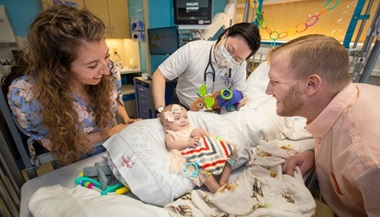Basal Cell Nevus Syndrome (Gorlin Syndrome)
Basal cell nevus syndrome, also called Gorlin-Goltz syndrome, is a rare autosomal dominant cancer genetic syndrome. It increases the risk for childhood brain tumor, ovarian tumors, and skin cancer. There is not a cure for this syndrome. Features linked to basal cell nevus syndrome may include:
-
Development of more than two basal cell carcinomas (cancer of the outer layer of the skin) or one at or before age 20.
-
Benign cysts in the jaw.
-
Characteristic facial appearance.
-
Calcification of the falx (a variation in the appearance of the skull that can be seen on X-rays).
-
Pits in the palms of the hands and soles of the feet.
-
Macrocephaly (enlarged head size).
-
Abnormal ribs or vertebrae.
-
Increased risk of medulloblastoma (cancerous or malignant brain tumor) during childhood.
-
Increased risk of cardiac or ovarian fibromas (noncancer or benign tumors).
Basal cell nevus syndrome is caused by changes in a tumor suppressor gene called PTCH1. It's located on chromosome 9q. Or the SUFU mutation gene on chromosome 10q can be affected. SUFU mutations can greatly increase risk of developing medulloblastomas.
Molecular genetic testing is available on a clinical basis to see if a mutation of PTCH1 or SUFU is present. This testing is to confirm the diagnosis or to test people with an affected family member.
Tumor suppressor genes often control cell growth and cell death. Every person is born with two copies of each tumor suppressor gene. One is inherited from the mother and one from the father. Both copies of a tumor suppressor gene must be changed (mutated) before a person's risk of cancer increases.
-
With basal cell nevus syndrome, the first mutation is inherited from either the mother or the father. This happens in 70% to 80% of cases. In 20% to 30% of cases, the first mutation is not inherited but the affected person is born with the new mutation. Whether inherited or not, this first mutation is present in all of the cells of the body from conception. It's called a germline mutation.
-
Whether a person who has a germline mutation will develop cancer and where the cancer will develop depends on where (which cell type) the second mutation happens. For instance, if the second mutation is in the skin, then skin cancer may develop. If it's in the ovary, then ovarian cancer may develop.
-
The process of tumor development needs mutations in multiple growth control genes. Loss of both copies of PTCH1 is just the first step in the process. Experts don't know what causes these extra mutations. Possible causes include chemical, physical, or biological environmental exposures (such as sunlight). Or there may be a chance of errors when cells copy themselves.
Some people who have inherited a germline tumor suppressor gene mutation may never have cancer. This is because they never get the second mutation needed to start the process of tumor formation. This can make the cancer seem to skip generations in a family. But the mutation is still there. People with a PTCH1 mutation may or may not have cancer. But they always have a 50% chance of passing the mutation on to each of their children.
The gene that causes basal cell nevus syndrome is not found on the sex chromosomes. So mutations can be inherited from the mother's side or the father's side of the family.
If you have a family history of cancers, discuss this with your doctor. Ask if you should be screened for a familial cancer syndrome. Also ask if you should be screened for certain tumors.





